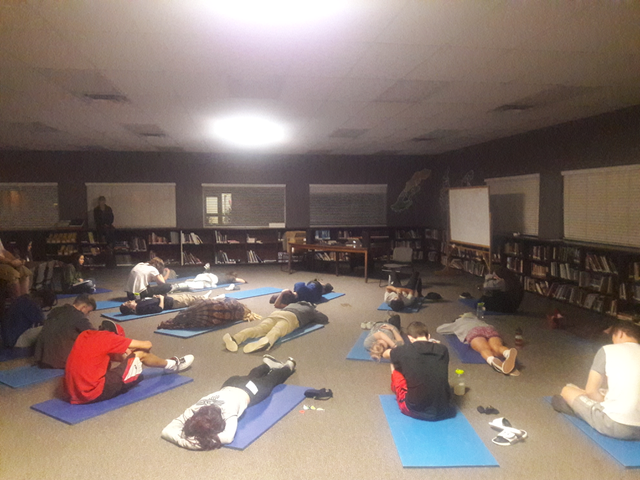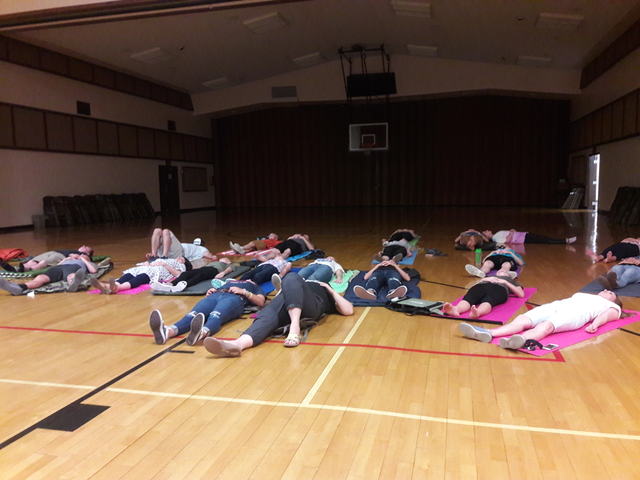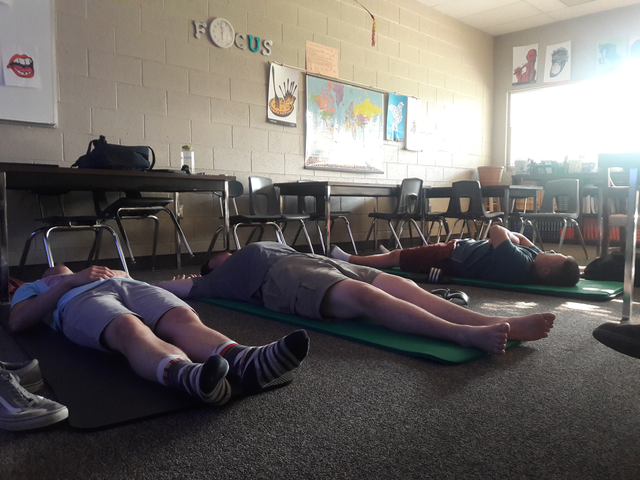
THE GENOTE BLOG
Inspiring, creating and living Health Music
HOW ABOUT A SIMPLE TIP FOR SUCCESS?
In response to numerous requests, here is the Back to School Sleep Tips Video. We've spent the whole month of August training students to adopt a healthy sleep schedule and we are happy to report that each of them are sailing away, even during the initial, brutal Back to School days.
We invite anyone to give it a try. One week is completely free!!!
Visit www.genotelab.com and select your age group (Child or Adult) and enjoy a good week of sleep.
After the School supplies, now what?
Genote offers your family Health Music™
Genote is the first clinically tested online streaming music platform. By signing up, you’ll get streaming access to our Health Music library. Developed with pediatric researchers around the world. Just select the area of well being you’d like to target and play high quality music on any device, anytime, anywhere.
You bought your school supplies, your bags are stuffed with new pens, colorful pencils, notebooks; you have your phones, your computer, your quick meals and so much more.
Yet, for at least few weeks, if not months, you will deal with one issue alone: sleep deprivation.
Surely it can be challenging to deal with classmates, teachers, routines, and demands, yet, the biggest challenge will be how to rest, quickly recover from the sudden change in habits, and set for a successful beginning of the school year.
The Struggle is Real
It can take kids over a month to realign their sleep schedule so that they perform their best in school. Some kids take even longer than that. The fall is a stressful period of the year, as parents struggle with re-aligning their children’s sleep schedules, cutting summer junk food, and helping kids focus on studying again. You can manage the transition with supportive tools to set your family up for success.
As children wind down from the excitement of summer vacations, barbeques, late nights and unstructured schedules, many return to school with increased anxiety. Parents often have to deal with nervous children who can be restless, grouchy, and even depressed for the first weeks of the new school year.
There have been many tricks and tips proposed for preparing kids for back-to-school anxiety, but here’s a new idea that may be one of the easiest to apply: music. Yes, music – long known to have positive affects on emotions – is finding more credence in the medical community for therapeutic care in kids of all ages. New studies suggest that “Health Music” can help children’s overall wellbeing by addressing stress, focus and sleep.
The findings come from a new company, Genote, dedicated to studying the benefits of music on better health. What kind of results are they seeing with children going back to school? “They just won’t go to sleep because they’re so excited about everything,” says Angela Duncan, a mother of five children from South Jordan, UT. “The new clothes, the new friends, the concerns about if they’ll like their teacher – it’s all very stimulating for them. But their ability to focus and learn really suffers.” Duncan is using Genote’s Health Music Albums with her children in 3rd grade, 2nd grade and Kindergarten and has seen positive results with the Health Music. “Going to sleep on time has been the biggest change,” she says. “We play the music while they’re getting ready for bed and falling asleep and it really calms them. If they can get to sleep on time, they’re able to get up early, concentrate on the day ahead of them, and they’ve done much better at school because of it.”
Designed by decoding the “DNA of music” and applying it to clinical/medical situations, Genote’s Music Intelligence Technology™ was developed in collaboration with experts in neuroscience, psychology, neonatology, geriatrics, sports medicine, and, of course, music. Genote has developed an algorithm that combines elements of various music compositions to produce therapeutic value for the listener.
"When it comes to music therapy, other solutions simply mask background noise. Many non-scientific solutions do nothing to prepare the brain and the body for improvement," said Edoardo Guerra, Chief Scientific Officer at Genote. "We designed Genote as a new system that can analyze music literature and apply the correct choice of music stimuli for those that want to improve the quality of their health.” Guerra and Genote founder Massimiliano Frani have worked with conditions of sleep deprivation, dementia, autism and even athletic recovery. They’re especially excited to see the positive changes in children.
Genote is the leading health music program that scientifically triggers positive functions in the brain and the body of all ages. The Genote Music Intelligence Technology™ is developed from the latest findings in many fields of medicine, music and wellness. Music albums are available at Genotelab.com. Genote is headquartered in Salt Lake City, Utah. For more information, please visit www.GenoteLab.com.
Adolescents struggling for life
I pretty much fell in love with Genote on the first Sundown session that I attended. I felt in sync with my emotions, they were truly mixed and molded in to who I was in that moment.
Recently, during a Genote initiative, I worked with struggling adolescents who are trying to develop skills to cope with gravely serious challenges. I wanted to create a team that could work together and share meaningful insights about themselves and their surroundings. I wanted them to share beauty and be persuaded to be real actors in their personal path to happiness.
Mental issues, emotional challenges and interpersonal relationships seem to be ever-increasing for the adult community and young generations. Approximately 1 out of 5 adolescents aged 13–18 (21.4%) experience a severe mental disorder at some point during their life. For children aged 8–15, the estimate is 13%. (1) More drastically, in 2015, statistics on adolescents and young adults aged 15-24 indicate a suicide rate of 12.5%. (2)
When the activities began, the group was rather small with new participants every week and with an inconsistent number of students. Some of them were excited to be there, and others were really tired and stressed out. One day, after some light conversation, we began the activity by trying to dig a bit deeper and getting to know them better. We asked them to share something about themselves, possibly something they had never shared before.
Some of them shared a few personal details, some spoke rather mindlessly, but, generally, we all felt that no one had decided to bring the conversation to a deeper level. While working with adolescents we try to maintain a consistent focus, help them recognize the superfluous in conversations and help them become more open to healthier relationships.
One day, we asked them to lay down and listen to the music we had prepared. Three compositions, with three different and carefully chosen emotional connotations and complexities. After 20 minutes of listening, we resumed the conversation by asking them to describe their experience, feelings and thoughts. This is when something special happened!
“I pretty much fell in love with Genote on the first Sundown session that I attended.
I’ve always greatly valued music and appreciation of art, and then being in a place of constant noise and stress (I would say) a time of quiet and isolation of music and art was very much needed.
Some sessions I really was entranced by the music and was able to devote my undivided attention to it, on other days especially days that I feel spaced out, acting as if I’m on autopilot I wouldn’t be able to concentrate on the music at all. It was just another hour that passed by my eyes. On the days that I was capable of absorbing myself into the music, I felt refreshed and was able to convert my newfound energy to the next few hours of the day.
My last Sundown session was an experience separate to the rest of the sessions.
I felt the singing and the music resonate through my body as I exhaled a deep sigh of dread for the upcoming separation. I felt in sync with my emotions, they were truly mixed and molded in to who I was in that moment. The separation between me and my friends/peers of elevations, my separation of all the unique experiences that I have been having whether it’s Genote or volleyball or groups. It was a hard separation, one filled with sadness, longing, and also excitement and hope.
That pretty much sums up my experience with Genote, hopefully this helps in one way or the other.
”
The general behavior changed, and the level of each student’s willingness to share their personal feelings and story increased considerably. The level of comfort created during the session, allowed them to listen to each other, find helpful insights and build meaningful memories. The quality of personal interchange increased; over the following months, the Genote Sundown sessions helped them discern trustworthy relationships and determine important building blocks for their character and for the future.
We studied music for a long time; over the last 30 years, music's applications in clinical settings have increased significantly, and we are amazed by music’s capacity not only to influence our emotions and biological parameters, but to push us to be better people and help us build great memories as a way to nurture great qualities within ourselves. We are continuously recording each new session and continue to update Genote Health Music. We see great potential. We see hope and growth, and that is what we work for.
Any Disorder Among Children. (n.d.) Retrieved January 16, 2015, from http://www.nimh.nih.gov/health/statistics/prevalence/any-disorder-among-children.shtml
Centers for Disease Control and Prevention (CDC) Data & Statistics Fatal Injury Report for 2015.
NAMI - National Alliace on Mental Illness http://www.nami.org/Learn-More/Mental-Health-By-the-Numbers#sthash.FgWBgscB.dpuf
Genote at the Vicenza Hospital
These experiences give us a firm hope and a renewed resolution to advance music’s collaboration with medicine.
After months of preparation, we finally get to start our music protocol at the Vicenza Hospital! After getting cleared by the Internal Review Board, we have the opportunity to test our entire procedure for pain management with babies for the first time.
The randomized study was designed to evaluate the effects of a Structured Music Listening Protocol on pain reduction for newborn babies that are going through a metabolic screening test 36 hours after birth. The test requires the nurse to prick a baby’s heel and squeeze some blood on a special paper to be sent to the lab for the analysis. Since newborn babies don’t have a high volume of blood, the pressure required to get enough blood out for the test can go on for several minutes.
Ouch.
Our hypothesis was that the babies receiving the music intervention, in addition to the standardized technique, might show a beneficial effects on pain reduction and pain management.
The morning the study was to begin, we had a brief meeting to introduce the research implementation staff to the procedure. The staff was represented by a pediatrician, a nurse, and two obstetric students. After the doctor described the procedure and Edoardo Guerra, our CSO and resident psychologist, presented some important aspects of the music methodology, we entered a small room selected for its low sound level.
Each of us were very focused and anxious for the first trial. The team of nurses selected two babies at random. The first received the procedure as per the standard hospital procedures (without music) and the second received the an additional Structured Listening Protocol. We paid close attention to everything that could affect the baby in the study: the type of light, sound level, distance of the speaker for the music, etc. Our preparation was scrupulously evaluated, up to the moment we were ready for our first baby.
The nurses brought the first baby inside the room with his cradle. He was sleeping and in a very quiet state. They placed him on the changing table and started the restraint procedure (wrapping technique and a pacifier with sucrose). The nurse pricked the baby’s heel and started squeezing the blood out for the analysis. The baby’s heart rate changed significantly and he went from a state of sleep to being agitated and fussy. The nurses were more tense, too. By the end of the several minute procedure, the baby was agitated and tired.
Then it was the second baby’s turn. He was sleeping too, but after he entered the room he started to wake up grumpily. The nurses did the same procedure, taking the same amount of time as they did with the other baby, but this time they turned on the Structured Listening Music Protocol. After they turned the music on the room’s environment changed completely, going from a harsh/cold medical room to a familiar and more qualitative care environment. The music was imposing they baby’s rhythm, emotion, and beauty on us. But more importantly, it was affecting the baby too. After just a few seconds of music, he listened to it, he turned toward it, and gradually returned to a quiet state. The nurse continued the procedure, and the baby never changed his quiet state throughout the entire procedure. The nurses were more relaxed and the baby was put in his cradle again and returned to his mom.
We won’t know the official results from the study at the Vicenza Hospital for quite some time, but these experiences give us a firm hope and a renewed resolution to advance music’s collaboration with medicine.
To keep up with more Genote™ studies and find opportunities to apply our music albums to your own medical experience, follow this blog and check out our website at www.genotelab.com.
Music After Cardiac Surgery: The Abbott Northwestern Experiment
At the Abbott Northwestern Hospital, doctors conducted a study to determine music’s effect on stress, anxiety and pain levels for heart patients immediately after undergoing cardiac surgery.
Today we wanted to highlight an institution’s endeavors to validate a particular value that we hold as a company: that music should be used a tool to enhance traditional methods of care in hospitals.
At the Abbott Northwestern Hospital, doctors conducted a study to determine music’s effect on stress, anxiety and pain levels for heart patients immediately after undergoing cardiac surgery. This jumping off point highlighted a substantial problem in hospitals: surgery patients really do suffer from acute or chronic stress, anxiety and pain. These problems can manifest themselves in myriad ways that likely don’t help the surgical procedure. Sleeping habits, blood chemistry, and post operational healing, for example, can all be negatively affected by stress and anxiety.
The study found a significant confirmation of the hypothesis; music really does reduce anxiety, stress and pain even in a high-stress situation like a post cardiac operation.
Music was found to reduce pain.
The results of the study are encouraging for all those who look to expand the use of music in medicine. However, for this study’s practical impact to take root, practitioners face looming obstacles such as music selection standards, audio equipment, music licensing fees, responding to patient musical feedback, training personnel, etc…
These questions are important and the medical world is taking steps forward daily toward resolving them. Music therapy organizations and companies like Genote™ commit enormous amounts of research and study to bridge the gap between doctors’ practice and music’s application in medicine. One day, music will work side by side with medical institutions for the benefit of the patients and the employees.
After all, if music has been scientifically proven to reduce pain and discomfort after surgery, why shouldn’t it be in every hospital?
We are happy that the Abbott Northwestern Hospital continues to develop their research on music and pain in the clinical experience.
Learn more about how music can benefit hospitals and patients at www.genotelab.com
The Smiling Assassin
World records are the result of unique performance, but more, they are the result of carefully dedicated life training.
At a massive invite-only track and field even called the Weltklasse Zürich in 1995, Haile Gebrselassie’s amazing performance broke the 5,000m race world record. Gebrselassie blazed across the finish line in 12 minutes and 44 seconds, maintaining a slightly over four-minute mile pace for more than three consecutive miles. When asked how he did it, the Ethiopian athlete gave all the credit to the catchy hit song “The Scatman.”
“It’s nice music, it’s fast written, that’s why I could break a world record, by that music.”
World records are the result of unique performance, but more, they are the result of carefully dedicated life training. Over 20 years ago music helped “The Smiling Assassin,” Haile Gebrselassie, rewrite the record books. He attributed this accomplishment to the tempo of the music. The Genote™ Company finds inspiration from incredible stories like this one, and our organization is committed to studying music’s complex power in accelerating the healing process and amplifying athletic performance and recovery. Gebrselassie demonstrated music’s ability to improve athletic performance, but he may not have realized the extensive role music took in his training and recovery. Indeed the fundamental assumption increase athletic performance is strictly linked to the balance given between work and recovery. The find of new non-invasive methodologies to improve the balance between these two areas of training is the goal of Genote™ research.
The fast tempo was the single musical element Gebrselassie recognized when crediting music with his victory. He later admitted that for longer distance races he replaces “The Scatman” so he can focus on other aspects of his running. Recent studies indicate that there could be essential musical components that affect different elements of athletic performance.
Genote™ collaborates with high level, international athletes in the areas of running, swimming, and cycling; research has found music to aid in recovery, sleep and health. By marrying music to other therapies or training programs, overall well being will be enhanced both in medical institutions, the home and even the competitive world.
Learn more about how music can improve your life at http://www.genotelab.com/.
3 Powerful Ways Health Music Can Enhance Athletic Performance
What if I told you that listening to expertly selected music compositions, in specific moments of your physical exercise could improve your health, recovery and physical results?
What if I told you that listening to expertly selected music compositions, in specific moments of your physical exercise could improve your health, recovery and physical results?
Music is made up of both many individual components and, especially,relationships between those components. Like in chemistry, where different components create chemical reactions, in music, different elements, such as tempo, rhythm, instrumentation, can trigger different reactions from people like modify breathing patterns, generate positive emotions and many other effects on psychophysiological parameters.
I want to share with you some tips on how integrating Health Music in your daily physical exercise routine will improve your health and recovery. Whether you are an amateur or a professional, you can witness real change. Each of the therapeutic areas described below can be found in Genote with a variety of Health Music protocols to tackle and improve your training and personal health.
We can summarize that major psychophysiological mechanisms, dedicated to increasing physical performance are linked to music’s ability to regulate arousal, and direct and increase our capacity to focus while increasing positive emotional responses and feelings.
Stress Reduction
Practice, strenuous training, and physical activity are often associated with physical and mental stress related to fatigue, change of habits or pressure by competitions and required improvement. However, even if there is a positive side of stress, like cold eustress that allows us to be more reactive and ready to perform, having high levels of continued stress might cause serious health issues. Listening to music can decrease stress and anxiety, cortisol levels, heart rate and blood pressure in people of all ages. Genote Health Music is the largest collection of therapeutic sound and music protocols made available for health, and it is so powerful in reducing stress and anxiety that is currently incorporated both in medical interventions and mental health institutions.
Sleep and Recovery
Recovery is one of the basic principles of training methodology (Rushall & Pyke, 1990). Athletes work hard to prepare and perform successfully. Unfortunately, many ignore or forget the performance benefits and the injury protection derived by including recovery within their daily training programs. Listening to music after intensive exercise has been proven to decrease the time needed to recover (Eliakim et al., 2013). Additionally, the College of Music and Dance in Philadelphia discovered how music was found to decrease anxiety related to illness and medical procedures by increasing the speed and the quality of physical recovery.
Supercompensation theory, showing the role of recovery in athletic performance.
Focus and Motivation
Because music stimulates the reward system, changes mood and enhances focus, it is no surprise that it has been used to attend important competitions and performances. In a study conducted by Dr. Karageorghis and Priest a,b, in 2012 they showed how music lead a range of positive effects, in lowering the perception fatigue, increasing motivation and enhancing perceived energy levels of athletes during physical exercise. Studies also show how music can increase visual perception and visual attention in patients with damage in areas related to perception.
The Yerkes–Dodson law originally developed by psychologist Robert M. Yerkes and John Dillingham Dodson in 1908, dictates that performance increases with physiological or mental arousal, but only up to a point.
Training is a matter of balance, motivation and consistency. It is important to keep in mind the direct effect of your routine in the efforts of enhancing your athletic performance. Recovery is a key aspect in building athletic performance. Optimized recovery allows high intensity training and better focus in the execution.
Music Helps Children During Medical Procedures
Listening to music reduced pain and anxiety, improving medical procedures on children.
Hospitals and dental clinics can terrify children – and for good reason. Pain, discomfort, and anxiety accompany children’s medical experience, but what if their pain could be reduced with music? A study by Dr.Tanja Bekhuis discovered music could make all the difference for children.
Dr. Tanja Bekhuis studied 19 random trials experimenting with music’s effect on children undergoing medical procedures, and her study of all of these trials in context found remarkable results. Listening to music reduced pain and anxiety, improving medical procedures on children in significant ways such as:
- Reducing pain and makes children more manageable and happy
- Decreasing procedure time and length of discomfort
- Reducing need for pain controlling drugs
This study opens up doors for further music exploration. It may be the music was only a distraction, a loud noise to block out strange auditory stimuli, or entertainment to pass the time. But research has verified that music may be more than that. In fact, music may even be fine tuned in order to help children cope with specific symptoms that come with pain and anxiety.
Music’s potential to make a profound impact on the medical community requires strict attention. That’s why music and medicine companies like Genote™ thoroughly study practical musical application to help individuals around the world better heal, sleep, and improve daily life.
We thank the wonderful scientists who conducted all the extensive studies to give us these valuable insights. These findings lay the perfect foundation upon which to build a new generation of music and medicine.
Music can reduce pain – music can do much more.
Learn more about the benefits of music at www.genotelab.com
The Importance of Early Auditory Experiences in Premature Infants - A Mom Testimony
My twins are almost 2 1/2 years old and have been listening to their Genote sound machine since they were infants. They initially spent 31 (my daughter) and 35 days (my son) in the NICU.
“A premature baby’s main challenges are represented by the immaturity of the infant that is thrown from the optimal environment of the mother uterus into a very uncomfortable place with sounds, noises, lights and painful procedures that prevent her recuperating and developing fundamental competencies for grow and health. The baby knows how to communicate and tell us many things, but she needs somebody to listen to her and look at her. (1)”
Preterm birth, is the birth of a baby at fewer than 37 weeks gestational age. It is a common condition that affected about 1 out of 10 babies (9.6%) in the US during 2016 (2) and is the most common cause of death among infants worldwide.
Because of the gravity of this situation and the possibilities that exposure to sound offers to preterm babies and their parents, Genote invested many years in research and clinical experiences to develop a method based on structured listening protocols designed to help the baby’s neurological development, improve sleep, pain management, and recovery. Optimized for the clinical setting as well as the home, the Genote system can be implemented by families or medical personnel during and after hospitalization.
Preterm babies that spend their first weeks or months in the neonatal intensive care unit (NICU) are deprived of the entire range of sounds that would come from their mothers. These absent sounds are mainly sounds they would be hearing while in utero; low-frequency bands of the mother’s voice and rhythmic bits from the mother’s heartbeat.
Countless studies reviewed by the Genote scientific team show the importance to protect the baby from a wide array of noises (including harmful white noise) while stimulating the auditory system with structured sounds and melodies that allow for proper stimulation, development of the auditory brain, speech and language acquisition. (3-5)
In our many stories of supporting and informing families struggling with this problem, we met many great mothers and strong babies that teaches us not only about the meaning of life but also of their great resiliency and the importance of the human interaction for their growth and development. Lately, we met Diana from Los Angeles, who decided to try Genote on her two premature babies. This is her testimony.
“My twins are almost 2 1/2 years old and have been listening to their Genote sound machine since they were infants. They initially spent 31 (my daughter) and 35 days (my son) in the NICU. The music has been so soothing to them and I believe it helps them understand melody that much more in their music class and in our life. I would highly recommend it to all newborns and napping little ones over white noise.
”
The Great Balancing Power of Music
When individuals feel down, they naturally turn to music for consolation. This published study may change the way you use music to regulate your mood.
When individuals feel down, they naturally turn to music for consolation. They attempt to drive away their negative feelings with songs expressing their personal mood and situation. But sad music doesn’t necessarily transform a sad person; rather, it can reinforce those emotions and skew perspective through emotional connections. Seeking to understand how music influences emotions, Frontiers in Human Neuroscience published a study that may change the way you use music to regulate your mood.
The medial prefrontal cortex (mPFC) is the portion of the brain associated with regulating emotions. Scientists at Aalto University monitored brain activity in the mPFC to determine the effects of different kinds of music on males and females. The study found when women listened to music as a diversion or distraction from negative feelings there was increased emotional regulation. Conversely, when men used music to reinforce negative emotions, their emotional regulation decreased, suggesting that sad music can help propel a person into a downward emotional spiral, or at least be ineffective and brightening someone’s mood.
In a nutshell, the study suggests that people are using music every day to combat or compliment their emotions, but improper use of music may only amplify their emotional concerns.
Aalto University’s study reinforces the notion that music has a profound influence on individuals’ lives. Music can be extremely beneficial when used in the correct way, but incorrect use can have adverse effects. Understanding music’s potential is just the beginning. That is the community of music and medicine is diving deeper into previously neglected areas of music research to discover how best to utilize music’s valuable capabilities.
With deeper knowledge and understanding of music’s influence on our lives, we can regulate our emotions with cognitive control. To learn more about extensive Genote™ Health Music discoveries, visit http://www.genotelab.com/.





























